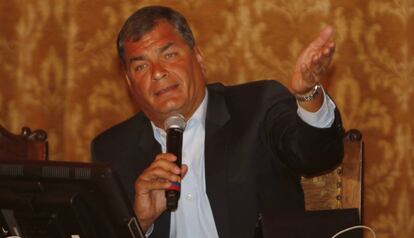Ecuador raises taxes to fund post-earthquake reconstruction
Correa announces hike in sales tax, while individuals who earn more than €878 a month will donate a day’s pay to rebuilding efforts

The Ecuadorian government has adopted “exceptional measures” to raise funds to meet the urgent needs of those affected by the 7.8 magnitude earthquake that killed 570 people and left more than 5,000 injured in the north of the country on Saturday.
Ecuador’s president, Rafael Correa, said the state would raise taxes to finance reconstruction efforts in the affected areas. Several towns have seen up to 85 percent of their infrastructure destroyed, while some areas need to be completely rebuilt, the president explained. Buildings will have be to be torn down while some towns need to be completely redesigned.
Ecuador will hike its sales tax – or value-added tax (VAT) – by two percentage points for a year, withhold 3% on profits, and also impose a 0.9% tax on “individuals whose assets are greater than $1 million [€878,000].” Meanwhile, those who earn more than $1,000 a month will contribute one day’s pay to rebuilding efforts.
“If you earn $1,000, you will contribute one day of just one month; if you earn $2000 [€1,757], one day for two months; and those who earn more than $5,000 [€4,400] will contribute one day during five months,” the president explained.
Correa said the government will know the exact cost of reconstruction in two weeks but he expects it to be roughly $3 billion (€2.6 billion). “If I am correct, this means nearly three percentage points of our GDP,” he told reporters in Quito.
He underscored that Ecuador “has to take temporary measures in light of the magnitude and unexpected nature of the cost,” because such a catastrophe would affect “even the richest country in the world.”
Correa also told the press that his administration was studying “the possibility of selling bonds on the international market,” among other initiatives, which include a tax-reform bill he sent to parliament a few days ago. “We will have to take exceptional measures to generate funds and face this emergency,” he added.
The Ecuadorian president said he has established contingency plans with the Inter-American Development Bank (IDB), World Bank, and Development Bank of Latin America. These institutions could make $600 million (€527 million) available “in the short term, which they could increase in the long term.”
“We have mourned our victims and we must keep mourning, but, I insist, let those tears fertilize the soil of tomorrow,” Correa added. The best act of international solidarity is to visit Ecuador, he added – “now more than ever.”
He thanked the international community for sending help in the form of food aid and specialists, including 1,073 rescue experts from Colombia, Cuba, Spain and Mexico who worked with Ecuador’s team of 600. One group from Mexico helped rescue six people who were trapped under the rubble.
Correa promised that the state would provide medical attention to those in the affected areas, even though three hospitals in Manta, Chone and Bahía de Caráquez collapsed due to the earthquake. He insisted on the need for medical clinics at the camps built for the displaced as rebuilding efforts go forward, a process that will take several years.
“This is not a three-day, three-week, or three-month problem,” Correa warned. “This will be a problem for years,” he explained, as Ecuador faces what he described as “its worst emergency crisis in the last 70 years.”
English version by Dyane Jean François.
Tu suscripción se está usando en otro dispositivo
¿Quieres añadir otro usuario a tu suscripción?
Si continúas leyendo en este dispositivo, no se podrá leer en el otro.
FlechaTu suscripción se está usando en otro dispositivo y solo puedes acceder a EL PAÍS desde un dispositivo a la vez.
Si quieres compartir tu cuenta, cambia tu suscripción a la modalidad Premium, así podrás añadir otro usuario. Cada uno accederá con su propia cuenta de email, lo que os permitirá personalizar vuestra experiencia en EL PAÍS.
¿Tienes una suscripción de empresa? Accede aquí para contratar más cuentas.
En el caso de no saber quién está usando tu cuenta, te recomendamos cambiar tu contraseña aquí.
Si decides continuar compartiendo tu cuenta, este mensaje se mostrará en tu dispositivo y en el de la otra persona que está usando tu cuenta de forma indefinida, afectando a tu experiencia de lectura. Puedes consultar aquí los términos y condiciones de la suscripción digital.








































